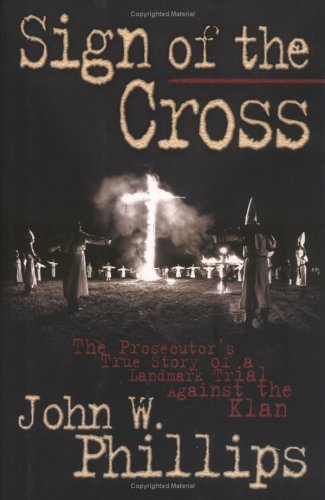|
|
楼主 |
发表于 2008-10-5 03:15:56
|
显示全部楼层
http://rapidshare.com/files/1492 ... ss__True_Crime_.rar

Sign of the Cross: The Prosecutor's True Story of a Landmark Trial Against the Klan
By John W. Phillips
--------------------------------------------------------------------------------
Publisher: Westminster John Knox Press
Number Of Pages: 319
Publication Date: 2000-04
ISBN-10 / ASIN: 0664221963
ISBN-13 / EAN: 9780664221966
Binding: Hardcover
--------------------------------------------------------------------------------
Product Description:
Sign of the Cross is the personal and true story of a prosecutor's struggle to stop a rash of flagrant Ku Klux Klan cross-lighting ceremonies which occured in California during the 1980s. Set against a background of Klan history and growing violence, prosecutor John Phillips relentlessly persists in his attempt to overcome the First Amendment defenses claimed by the Defense.
The book begins with the story of a black teen in Georgia whose uncle is severely beaten following a Klan cross-lighting ceremony near Atlanta. Twenty-five years later he has relocated his family to a middle class neighborhood in the foothills of the San Fernando Valley, but is shocked as he witnesses a Klan cross-lighting ceremony within view of his home. Unlike his uncle, he chooses to fight the Klan in the courtroom rather than the street.
But judges and prosecutors are reluctant to manage a case which they fear may be barred by First Amendment protections. Prosecutor John Phillips is willing, however, for his own reasons. He recognizes that the cross-burning was intended to intimidate minorities and spark violence, and he stakes his career that he can prove this constitutes an unlawful assembly. Above all, he believes the cross is the Christian symbol of Christ's forgiveness and love, and that the cross must not be used as the Klan's symbol of intimidation and hatred.
The prosecutor, author of Sign of the Cross, details his statewide investigation of Klan activity. Informants come forward who warn of a secret Klan brotherhood, whose intent includes execution murder and the overthrow of the federal government. Momentum builds toward the trial.
At one point the case is dismissed as a judge explodes in a tirade at anti-Klan demonstrators who have disrupted his court. Within days, four of the defendants embark upon a series of bank and armored car robberies, execution murder, and gun battles with law enforcement. The charges in the cross-lighting are reinstated two years later and Phillips, who had lost and left the Prosecutor's Office, is given his chance of both personal redemption and social justice. He is hired as Special Prosecutor by the Los Angeles County District Attorney for one last trial.
The story relates intense courtroom drama, before the jury and in the judge's chambers. The prosecutor details his trial strategies, and the testimony of witnesses called by both the prosecution and the defense. They relate the notorious deeds of the present day white supremacist movement as well as the history of the Klan and the significance of the cross-lighting ritual. The reader is ultimately left to decide the balance between freedom of speech and freedom from fear. |
|